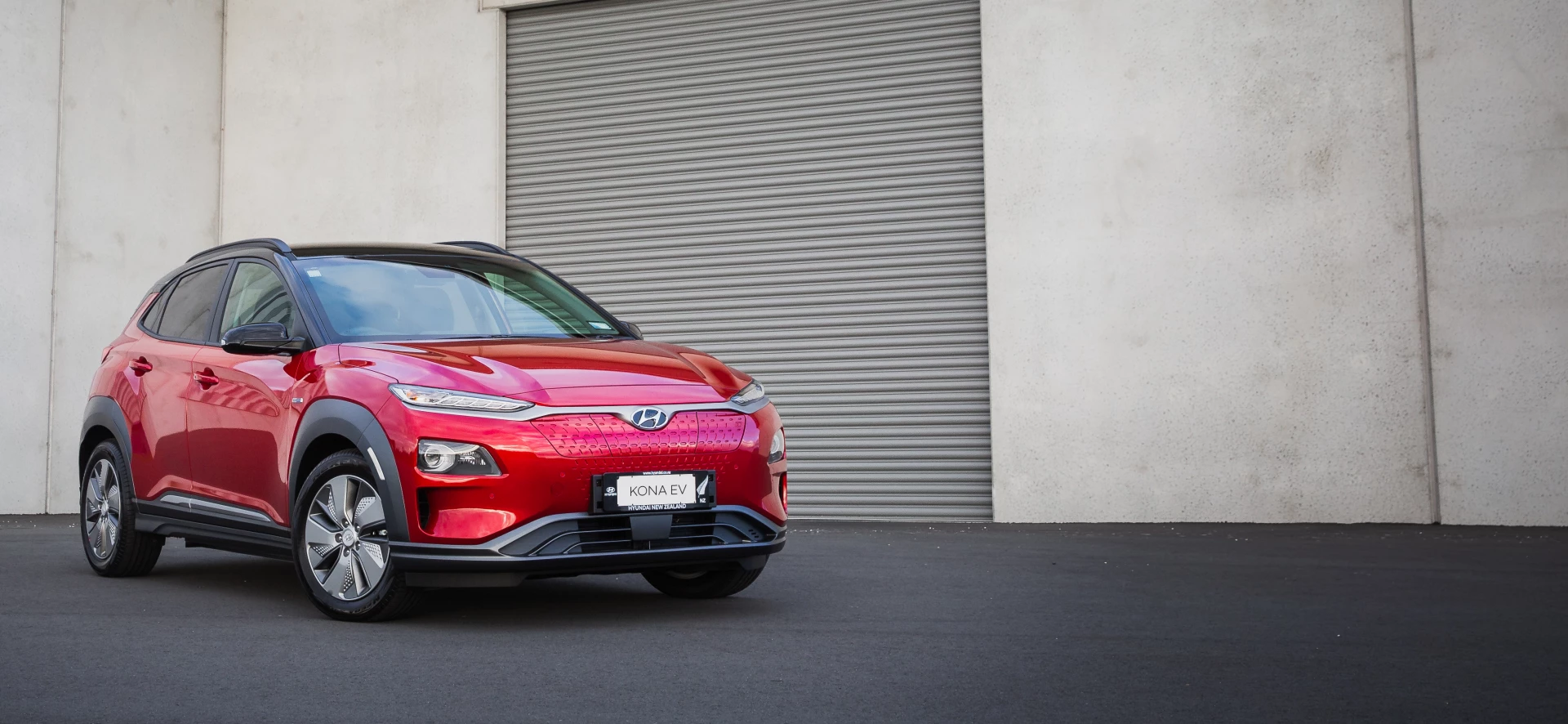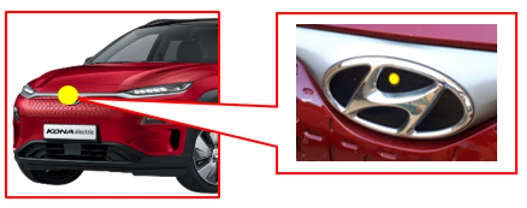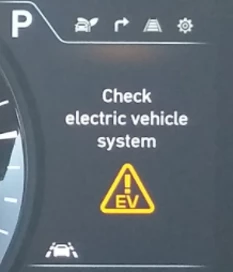Share
Hyundai Electric Vehicle Battery Recall
Hyundai is conducting a safety recall in New Zealand (and in other global markets) to address a potential manufacturing defect with the Electric Vehicle (EV) lithium-ion (“Li-ion) battery in Kona EV vehicles (model years 2019-2020) that could result in a vehicle electrical short circuit. The FAQs and advice below is for customers affected by this recall.
Customer contact details
If you've received a letter in the mail notifying you that your vehicle is affected by this recall and you'd like to receive email updates from us about the progress of this recall campaign, we recommend that you update your contact details below to ensure we have your correct email address on file.
FAQs and advice
What is the safety concern?
This recall relates to a potential concern with the vehicle’s Lithium-ion (Li-ion) high-voltage battery system which may have an Anode (-) Tab that is folded over and without insulation coating on the Cathode within the battery cell. A folded Anode Tab in the battery cell could allow the Lithium plating on the Anode Tab to contact the Cathode resulting in an electrical short inside the Battery System Assembly (BSA).
What are the affected vehicles in this recall (11D043)?
This latest recall will target specific Kona Electric vehicles produced between 11 May, 2018 - 13 March, 2020.
What remedy will be applied for this recall?
For this latest recall, specific vehicles will receive a replacement Battery System Assembly. Others will require the Battery System Assembly’s bar code to be digitally scanned with the Hyundai diagnostic tool and depending on the scan result:
a) Receive a Battery Management System software update only (or)
b) Receive a replacement Battery System Assembly
Affected vehicles, the high-voltage battery system will be inspected and replaced — if necessary.
What is the purpose of this initial “digital scan of the Battery System Assembly bar code”?
This digital online scan will confirm via a centralised database if the “Cathode tab” isolation coating of battery cells was applied during the Battery System Assembly manufacturing process.
- If it was applied, a Battery Management System software update is only required.
- If it was NOT applied, replacement Battery System Assembly is required.
How will I know if I have an affected vehicle?
We will be in touch with you initially by mail to inform you that your vehicle is affected and provide information on our recall implementation plan. After this, we will update you via email. For us to do this, we need to have an accurate email address on file. Please ensure you update your details if your vehicle is affected.
Didn’t Hyundai already release a recall for this issue before in New Zealand?
Yes, we released a recall (Kona EV only) for this issue back in November 2020, however the scope has since changed.
How is this issue different to the previous one?
The differences between the two were the countermeasures & extending the affected models to include certain EVs;
1. For the recall released in Nov 2020 (initial), that involved a software update for the Battery Management System (BMS), which was designed to continuously monitor and perform self-diagnostics to the battery system. If any early electrical deficiencies were detected, a warning lamp would illuminate, the EV system shut-down (immobilising the vehicle) and a replacement of the Battery System Assembly (BSA) would be required.
2. For the latest recall, Hyundai New Zealand plans to make contact with you should your vehicle be affected and inform you when the remedy is available for your vehicle to be completed whereby the high-voltage battery system will be inspected, and replaced — if necessary.
As an interim countermeasure for this latest recall, if your vehicle is affected, it is recommended to manually lower the battery’s State of Charge (SoC) limit (to 90%) via the vehicle’s infotainment system. By lowering the battery’s SoC this mitigates any risks, until we can carry out the remedy.
Why is another software update part of this latest recall?
The only change applied for this new software version is the way the Battery Management System (BMS) will manage any unfortunate system faults in the future.
Before, the system would completely shut down the EV system making the vehicle immobilised. Now, with the update, if an early (specific) electrical deficiency is ever detected in the future, a warning lamp will illuminate and limit the maximum charge limit to 80%, but still allow the vehicle to be driven. However, there could be circumstances where the system will completely shut down the EV system making the vehicle immobilised.
How does the Battery Management System (BSA) continuously monitor and perform self-diagnostics to the battery system & how will I know it’s happening?
The battery self-diagnosis starts when the vehicle is on AC or DC charging. The Battery Management System will momentarily stop charging the battery and carry out battery self-diagnosis – if no early electrical definancey is detected charging will automatically resume.
- When the State of Charge (SoC) is less than 75%, the battery will stop charging and carry out a battery self-diagnosis at the point of 80% (SoC). If no issues are detected, charging will automatically resume. (battery self-diagnosis time approx. 15-20mins)
- When the State of Charge (SoC) is less than 85%, the battery will stop charging and carry out a battery self-diagnosis at the point of 90% (SoC). If no issues are detected, charging will automatically resume. (battery self-diagnosis time approx. 15-20mins)
During this operation, you may notice the ‘High-voltage Warning Indicator’ located on the front Hyundai logo will illuminate.
When this function lamp indicator is illuminated – high-voltage electricity is “flowing” in the vehicle. Kona EV has a function to check the battery status at all times, and this high-voltage warning indicator illuminates when this battery check is in progress. After this recall is completed battery checks like this will occur more often and at shorter intervals than before. This will have no effect on driving range.
My battery was already replaced as part of the initial recall, will it need this latest recall too?
Some vehicles will need to return to have the latest Battery Management System software installed, because at the time of some of the battery replacements the new software was not available. There is no need for concern, since the Battery System Assembly was replaced (see: Why is another software update part of this latest recall?). We will be in touch with you to arrange this software update – if required.
I am uneasy from the standpoint of driving my Kona EV every day. Are there any interim measures I can do until this recall is completed?
Yes, we recommended to keep your Kona EV State of Charge (SoC) at a maximum level of 90% for all types of charging (DC Rapid, AC Fast & AC Slow).
How do I change the State of Charge (SoC) maximum level to 90%?
You can change the State of Charge (SoC) for your Hyundai through your vehicles multimedia system. This process should only take a couple of minutes.
Will charging to 90% completely eliminate the risk of an electrical short circuit?
It greatly reduces the risk, but we cannot definitively say that it completely eliminates it. We have not seen this issue take place with a car charged to 90%, or anything less than 100, in fact, but we aren’t in a position to guarantee a zero risk situation. What we can say that the risk is greatly reduced.
Do I reduce my State of Charge (SoC), even if my battery was recently replaced?
No, you can resume your own charging preferences.
Will my vehicle stop while driving ?
No, unless this is caused by some other issue with the vehicle. However, should the vehicle’s Malfunction Indicator Lamp illuminate or should your vehicle’s cluster ever display the “Check Electric Vehicle System” error message (pictured) – please contact us immediately on 0800 HYUNDAI (498 632).
For this latest Recall, what will happen between now and when my vehicle receives its replacement Battery Pack?
You will be notified directly by Hyundai New Zealand in due course to return to your authorised Dealer / Service Agent to have this recall completed.
What about parts supply ?
We have been working with Hyundai Korea, and we have a monthly shipment plan of high-voltage batteries for affected Kona EVs. Please note however, we are limited to the numbers of high-voltage batteries we can receive on any given shipment due to the same supply chain constraints all importers are faced with.
Can the vehicle catch an electrical short circuit after its just parked?
Currently, all of the overseas reported incidents of this concern have occurred while on charge (or just recently charged) to 100%. For that reason, until the battery pack is replaced, we recommend customers charge to 90% maximum. Instructions to restrict your State of Charge (SoC) can be found here.
How long will it take to complete the latest software upgrade & Battery pack replacement, should my vehicle require it?
You will be notified directly by Hyundai New Zealand in due course to return to your authorised Dealer / Service Agent to have this recall completed. Below are indicative timeframes for the Software upgrade and Battery System Assembly replacement:
- Software upgrade approx. 45mins to complete
or
- Battery System Assembly / Battery Pack approx. 4 hours to replace
We will require the vehicle for the full day when replacing the Battery System Assembly. This extra time will allow the Dealer to check the overall system and recharge it.
Is my vehicle unsafe to drive?
No, your EV is not unsafe to drive. To date the reported incidents appear to be when the vehicle is fully charged and connected to a charging unit. To mitigate the risk we recommend that you:
- Only charge your EV to 90%. This significantly mitigates the risk of an electrical short circuit. Instructions on restricting our State of Charge (SoC) can be found here.
- Do not leave your vehicle on the charger overnight. Disconnect once completed.
- If you notice any warning lamps or anything else of concern or should your vehicle’s cluster ever display “Check Electric Vehicle System” error message (pictured) – please contact us immediately on 0800 HYUNDAI (498 632).
I read that overseas they are telling customers to park outside.
We are aware that other markets are advising customers as a precautionary measure to park their vehicles outdoors and/or away from structures until their vehicle is remedied. We have not received that advice from Hyundai Motor Company Korea, however should you like to do so as a precaution that is your decision.
What about the Kona EV Series II or IONIQ 5 Model – will they have the same issues?
No, the battery packs used in Kona EV Series II are not affected, as this issue was corrected before start of production with Kona EV Series II.
IONIQ 5 battery cells are manufactured by a different supplier (SK Innovation).
I’m considering buying a Kona EV Series II or IONIQ 5. Would you be willing to trade-in my current Kona EV, even if it's got a battery fault?
Yes, we would definitely consider trading-in your current Kona EV for you to purchase the Kona EV Series II or IONIQ 5 – If you're interested in this option, please email customerservice@hyundai.co.nz or call 0800 HYUNDAI (498 632).
What are you going to do with all of these batteries that are being replaced ? How are you recycling them?
We take sustainability very seriously and we are working on what to do with batteries that are replaced. Currently there are no large scale Li-ION battery recyclers in New Zealand. The good thing is that, in general, a minimum of 95% and up to 99% of an EV battery can be recycled. We are members of the Battery Industry Group in New Zealand and we are collaborating on a stewardship scheme for EV Battery recycling &/or second life applications.
Other questions?
No worries at all. We are here to help answer any other questions you may have. Please email customerservice@hyundai.co.nz or give us a call on 0800 HYUNDAI (498 632) to chat to a member of our team. We'll do our best to help you out!


